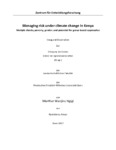| dc.description.abstract | Climate change and related shocks are major challenges facing agricultural performance, poverty reduction efforts, and economic growth in developing economies. Managing risks is vital because climate change and shocks lead to depletion of assets, loss of livelihoods and reduce pathways to diversify income. Besides, there is a widespread agreement that climate change impacts are not gender neutral. This study aims to contribute to the development of effective policies that assist households in managing risks under climate change through assessing the coping capacities and the impact of multiple shocks on household assets and poverty transitions, applying a panel data set of 360 households in rural Kenya. The study aimed to identify what kinds of assets are most effective in empowering and building resilience of poor rural households and communities under accelerating climate change. The study finds that households and individuals count on two major coping strategies to smooth their consumption level, namely adjusting their livestock portfolios and borrowing from groups. The latter strategy is particularly important for asset-poor and female-headed households in safeguarding their already low asset base. Through applying a unique intra-household survey involving 156 couples in rural Kenya, this study examines how husband and wife within the same household perceive climate risks, undertake adaptation strategies, access productive resources and participate in group-based approaches. The findings indicate that options for adapting to climate change closely interplay with husbands’ and wives’ roles and responsibilities, social norms, risk perceptions and access to resources. A higher percentage of wives were found to adopt crop-related strategies, whereas husbands employ livestock- and agroforestry-related strategies. There are gender specific climate information needs, trust in information and preferred channels of information dissemination. Further, it turned out that group-based approaches benefit husbands and wives differently. Group-based approaches provide avenues for diversifying livelihoods and managing risks for wives, while they are pathways for sharing climate information and adaptation ideas for husbands. Social groups help husbands and wives to enhance their welfare through accumulating vital types of capital and improving food security outcomes. Lastly, by applying a value-based approach, this thesis shows that men’s and women’s intrinsic values may on one hand promote climate change adaptation, but on the other hand, hinder the uptake of specific climate-smart practices in addition to encouraging unsustainable adaptation behavior. The key policy interferences for fostering resilience against multiple shocks involve designing livestock protection policies and scaling-up group-based approaches. There is also a need for sharing of climate and agricultural information through easily accessible channels by both men and women, such as information, communications and technologies (ICTs) as well as an effective agricultural extension system. There is a need for policies that nurture and strengthen social capital and group-based approaches for men and women at community level. Furthermore, organizations that are involved in development interventions and climate risk management will require to work together with group-based organizations that reflect gender reality on the ground in order to effectively support men’s and women’s specific abilities to manage risks and improve well-being outcomes in the face of accelerating climate change. | en_US |

